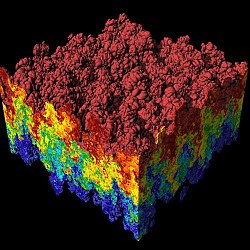Visualization concepts
Visualization or visualisation (see spelling differences) is any technique for creating images, diagrams, or animations to communicate a message. Visualization through visual imagery has been an effective way to communicate both abstract and concrete ideas since the dawn of man. Examples from history include cave paintings, Egyptian hieroglyphs, Greek geometry, and Leonardo da Vinci’s revolutionary methods of technical drawing for engineering and scientific purposes.
Visualization today has ever-expanding applications in science, education, engineering (e.g., product visualization), interactive multimedia, medicine, etc. Typical of a visualization application is the field of computer graphics. The invention of computer graphics may be the most important development in visualization since the invention of central perspective in the Renaissance period. The development of animation also helped advance visualization.
Applications of visualization
As a subject in computer science, scientific visualization is the use of interactive, sensory representations, typically visual, of abstract data to reinforce cognition, hypothesis building, and reasoning. Data visualization is a related subcategory of visualization dealing with statistical graphics and geographic or spatial data (as in thematic cartography) that is abstracted in schematic form
Applications of visualization
- Scientific visualization
- Educational visualization
- Information visualization
- Knowledge visualization
- Product visualization
- Visual communication
- Visual analytics


